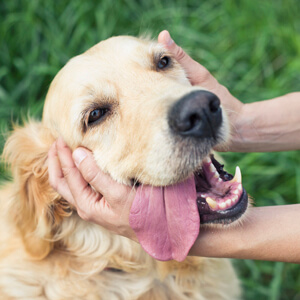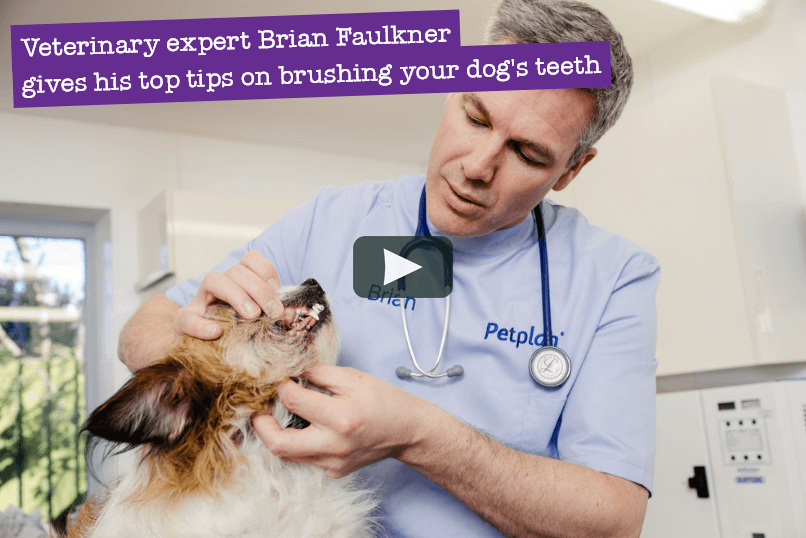Red or bleeding gums can indicate diseases like gingivitis.
Pet dental cover for illness and injury included as standard
Scroll to topics:
Three questions to ask your pet insurer
Does my pet need cover for dental injuries and illness?
Do Petplan policies cover teeth preventative descaling?
Spotting signs of common dental problems
Unlike a lot of pet insurers, Petplan cover for dental injuries and illness as standard. You may be wondering why our insurance covers dental illnesses, when others don’t. This is because we know that your pet’s teeth and gums are a crucial part of their health. In fact, we think having dental cover for illness and injury is so important you should always ask if its included when shopping around for pet insurance.
Scroll to topics:
Three questions to ask your pet insurer
Does my pet need cover for dental injuries and illness?
Do Petplan policies cover teeth preventative descaling?
Spotting signs of common dental problems
Three questions to ask your pet insurer
To make sure you end up with a policy that will give your pet the best possible care, always look beyond the headlines and ask pet insurance companies these three simple questions:
- Are there any additional limits within the vet bills cover?
- Do you cover dental illness and injury?
- Will I pay more if I claim?
And yes, of course as long as you have an annual dental check and follow your vet’s advice we cover dental illness and injury. And no, you won't pay more for claiming.
Does my pet need cover for dental injuries and illness?
As a responsible pet owner, you’ll know what it takes to keep their coat trim and their teeth clean. But did you know that if their mouths aren’t healthy, they have the potential to impact the rest of the body? This can lead to further illness.

Just like us, dogs and cats are susceptible to teeth and gum problems, including plaque build-up, periodontal disease, cavities and gingivitis. Of course, our four-legged friends use their teeth for a lot more than we do – grooming themselves and carrying all sorts in their mouths while exploring and playing – making cover for dental injuries and illnesses all the more important. And although you might expect dental treatment to be included across the board, some insurers may not provide cover for both injury and illness. Meaning that cheaper pet insurance policies may end up costing you more in the long run.
Do Petplan policies cover teeth preventative descaling?
It’s your responsibility to cover the cost of routine health checks and procedures, including preventative descaling, vaccinations, as well as cover against internal and external parasites such as fleas, ticks and worms. However should your pet develop a dental disease or injury despite your best efforts, we can help cover the costs of their treatment, so your pet can have the best care possible.
If your pet is exhibiting signs of common dental problems (as shown below), they could be experiencing some pain in their mouth so make sure to see your vet. As long as your pet has had an annual dental check and you’ve undertaken any recommended treatments within six months of the check, you’re covered. Your annual booster appointment is a great time to schedule your annual dental check-up and most vets are happy to do both at the same time.
Spotting signs of common dental problems
Red gums
Discolouration of teeth
Decaying or darkened gums
Bad breath
Difficulty eating

Spotting signs of common dental problems
Red gums
Discolouration of teeth
Decaying or darkened gums
Bad breath
Difficulty eating

Red or bleeding gums can indicate diseases like gingivitis.
There could be tartar build-up which can be prevented by regularly brushing their teeth.
Decaying gums or seeming darker in appearance could be signs of periodontal disease so best to get them checked by your vet.
One of the most common causes of bad breath is build-up of plaque and bacteria which can ultimately lead to periodontal disease.
Not eating or having difficulty chewing their food could mean tooth pain, or could be caused by build-up of toxins in the body.
Preventing dental issues in dogs
and cats
Preventing dental issues in dogs and cats
There are lots of things you can do at home to keep your pet’s teeth strong and white, including daily brushing, good quality food and using veterinary recommended dental treats. It’s important not to use human toothpaste, as it contains fluoride as well as artificial sweeteners like xylitol, which can lead to kidney failure in cats and dogs.
Begin brushing your pet’s teeth at a young age in order to familiarise them with the process. Whilst puppies and kittens also have temporary teeth which will be replaced between three and five months old, they are more likely to accept having their teeth brushed if they get used to the process whilst they are very young and be more amenable to allowing you to putting your fingers in their mouths. It is best to use a finger applicator to apply the pet-friendly dental gel. Larger dogs may accept a soft toothbrush. Look out for our tips on tooth brushing for dogs and cats.


Avoid toothless policies
To take the best care of your pet, you need pet insurance with more bite. Make sure your insurance covers you for dental illness and injury to help support your pet’s health. With insurance from Petplan, you and your pet will both have something to smile about.
Frequently Asked Questions
Does Petplan pet insurance cover dental treatment?
Yes, it does. We’ll cover the treatment of a dental injury and illness providing your pet has had a dental examination by a vet within 12 months prior to the onset of the dental injury or illness and that any treatment recommended was carried out within three months of the examination.
How much does cat teeth-cleaning cost?
Cleaning costs will differ depending on the extent of plaque and tartar build up. Your vet should be able to provide you with an estimate of cost after they have examined your pet’s teeth.
What can I give my dog for tooth-pain relief?
Always consult your vet if you notice your pet is demonstrating any signs of discomfort. Please do not use human medicines or any other medicine that your vet has been prescribed for another reason.
Do dogs teeth really need to be cleaned?
Yes, good dental hygiene is really important for dogs. Not only can neglect lead to gum disease and the subsequent loss of the teeth, bacteria will enter the bloodstream, and become lodged in organs that filter the blood such as the kidneys and liver. These bacteria can then multiply and lead to failure of these organs.
How often should cats get dental cleaning?
You should aim to have your cat’s teeth examined by a vet at least every 12 months to determine if any treatment is needed. In between appointments, you should look to establish a cleaning routine at home, to help maintain healthy teeth and gums.
